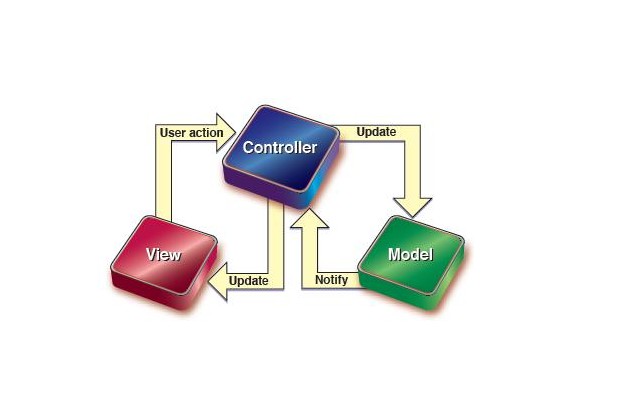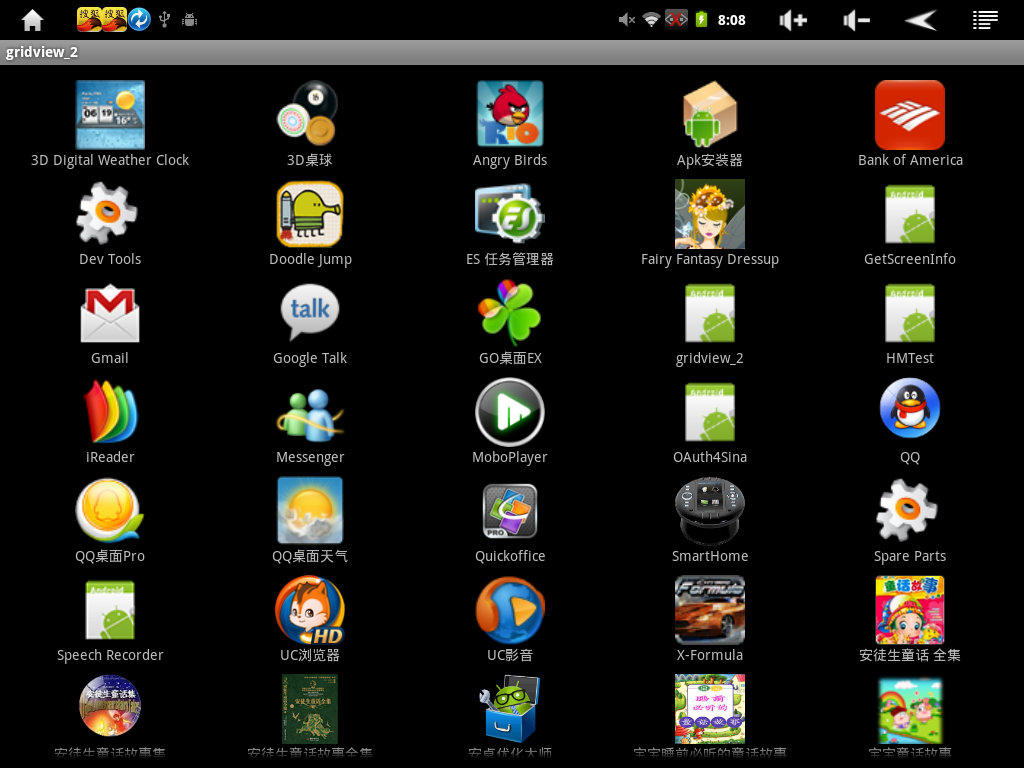Android中常见的MVC模式
MVC模式的简要介绍
MVC是三个单词的缩写,分别为: 模型(Model),视图(View)和控制Controller)。 MVC模式的目的就是实现Web系统的职能分工。 Model层实现系统中的业务逻辑。 View层用于与用户的交互。 Controller层是Model与View之间沟通的桥梁,它可以分派用户的请求并选择恰当的视图以用于显示,同时它也可以解释用户的输入并将它们映射为模型层可执行的操作。

Android中的Launcher
通过查看Android中的Launcher的源码,大家会发现其中会有LauncherModel.java,Workspace.java,Launcher.java。
其中LauncherModel为辅助文件封装了许多对数据库的操作(对应MVC中的Model);Workspace为一个抽象的桌面,将应用显示在用户面前,与用户进行交互(对应MVC中的View);Launcher是主要的Activity,里面有很多对用户的操作进行处理,并且将结果反馈在Workspace中(对应MVC中的Controller)。
在Android中有常见的ListView,GridView,Gallery等等一些控件能够很好的体现MVC模式,下面将一GridView显示设备上的所有应用为例子讲解MVC模式的应用。先上图。
- <?xml version="1.0" encoding="utf-8"?>
- <LinearLayout xmlns:android="http://schemas.android.com/apk/res/android"
- android:orientation="vertical"
- android:layout_width="fill_parent"
- android:layout_height="fill_parent"
- >
- <GridView android:id="@+id/myGrid"
- android:layout_width="fill_parent"
- android:layout_height="fill_parent"
- android:padding="10dip"
- android:verticalSpacing="10dip"
- android:horizontalSpacing="10dip"
- android:numColumns="5"
- android:stretchMode="columnWidth"
- android:gravity="center"
- />
- </LinearLayout>
顾名思义,GridView就是MVC中的View负责显示。
获取设备上安装的应用信息所有对应的方法,这就是对应的Model。
- public void bindAllApps(){
- //这里是关键哦,我们平时写的应用总有一个activity申明成这两个属性
- //也就是应用的入口
- Intent mainIntent = new Intent(Intent.ACTION_MAIN, null);
- mainIntent.addCategory(Intent.CATEGORY_LAUNCHER);
- //符合上面条件的全部查出来,并且排序
- mAllApps = mPackageManager.queryIntentActivities(mainIntent, 0);
- Collections.sort(mAllApps, new ResolveInfo.DisplayNameComparator(mPackageManager));
- }
方法中 mAllApps对应的类型为List<ResolveInfo> 。
在该例子中最要的就是Adapter,是Model和View中的桥梁,就是 Controller。
- private class GridItemAdapter extends BaseAdapter{
- private Context context;
- private List<ResolveInfo> resInfo;
- //构造函数
- public GridItemAdapter(Context c,List<ResolveInfo> res){
- context = c;
- resInfo = res;
- }
- @Override
- public int getCount() {
- // TODO Auto-generated method stub
- return resInfo.size();
- }
- @Override
- public Object getItem(int position) {
- // TODO Auto-generated method stub
- return null;
- }
- @Override
- public long getItemId(int position) {
- // TODO Auto-generated method stub
- return 0;
- }
- @Override
- public View getView(int position, View convertView, ViewGroup parent) {
- convertView = LayoutInflater.from(context)
- .inflate(R.layout.application_layout, null);
- ImageView app_icon = (ImageView)convertView.findViewById(R.id.app_icon);
- TextView app_tilte = (TextView)convertView.findViewById(R.id.app_title);
- ResolveInfo res = resInfo.get(position);
- app_icon.setImageDrawable(res.loadIcon(mPackageManager));
- app_tilte.setText(res.loadLabel(mPackageManager).toString());
- return convertView;
- }
- }






 浙公网安备 33010602011771号
浙公网安备 33010602011771号